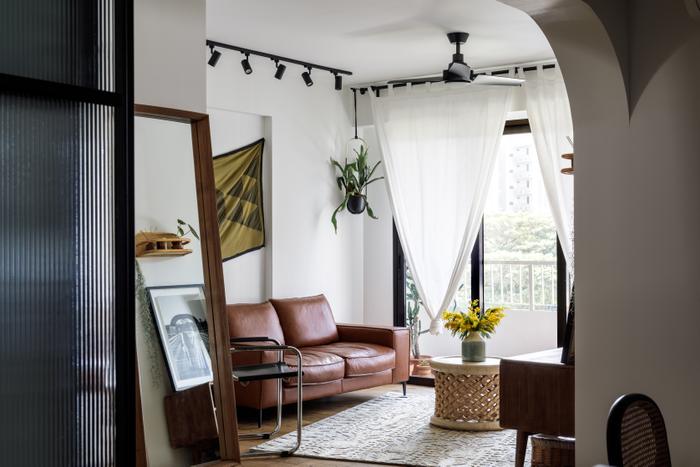It might be in Singapore, but the Mediterranean vibes of this 4-room flat are 100% real.
‘Japandi’ is a common example of hybrid interior design, but have you heard of ‘Moditerranean’? If you haven’t, you’ll want to take a look at Fazlie and Corinne’s home at Canberra Crescent.
By taking inspiration from popular design elements from the 50’s to 60’s as well as the Italian coast and countryside, the couple succeeded in turning their 4-room HDB flat into a ‘beach house’ that has both a rustic-chic/farmhouse vibe and mid-century modern appeal going for it.

View this project by The Local INN.terior
Pulling off this unique look required some help, so Fazlie and Corinne engaged the services of The Local INN.terior, and to find out more about their renovation journey, we sat down for a chat with the both of them.
About themselves and their home

Corinne (C): I am currently a teacher, but I have been in a few different industries in the past couple of years. I was with the National Arts Council for about 5 years and I was also working with flowers at one point. So, I think these jobs did have an influence on the look of our home.
Fazlie (F): I am an art director for a magazine, and being in the creative industry, I just like beautiful things. Other than that, I’m a father to a daughter who’s 12 this year.

C: I’d say that our home’s look is a 20:80 split between mid-century and Mediterranean. I have always been interested in different aspects of mid-century design, from furniture to graphic design, so naturally, that became part of the aesthetic.
Then, there was the time that we went to Italy. Although we were in Florence, we ended up exploring the Southern areas as well. The terrain in the countryside really caught our interest – there’s something about it that’s just very natural and honest, and I wanted to capture the same feeling in our home.

The floor plan for Corinne and Fazlie’s home.
About their home’s new look
C: Going back to the earthy, countryside vibe, the colours that we chose are all very natural. As you can see, there’s a bit of green, olive and brown. It was also important that the walls are white. To me, white walls are like a blank canvas, and it makes a good backdrop. I can simply put up an art piece or switch things up with anything that suits our mood.

The dining area’s rattan chairs were purchased from Hock Siong. “We had to make a dash for them because there were only 20 pieces, but by the time we got there all of them were gone,” says Corinne. “Luckily, they had kept some spares for exchanges, and we bought them.”

F: So far, most of the friends and relatives who have visited us are really attracted to our dining area in the sense that we don’t just have one, but two communal zones.
I find it a pity that in most homes the dining area is just only a space for having meals simply because it isn’t the most comfortable spot for entertainment. So, I am really happy about ours because you can just sit there for the entire night and not want to move even though it’s a small space.

C: Just to add on, I really like the kitchen’s folding screen. You can close it very easily when the air-conditioning is on, and there’s a smaller window where we can pass food out from; it really makes having meals at home fun because it sort of feels like you’re at a diner.

F: So, being the only one who cooks in this house [chuckles], the kitchen is very, very important to me. Not just in terms of functionality, but design too.
Honestly, I think the entire space is quite small, so this is the closest I can get (to a dream kitchen). With the small counter by the stove, I have enough room to do my slicing, cutting, and other preparation work. I wouldn’t call it ample, but there’s also sufficient storage for snacks, dry goods and all that stuff.

Another thing that I was very particular about was the hood; I only wanted a chimney hood, nothing else. I like the aesthetic of it, it looks more traditional. The oven was also a must-have because I bake.
Like the dining chairs, the farmhouse sink was something that we searched high and low for. I did some research, and apparently, it’s recommended that the sink be made of fireclay for crack resistance. So, I went on a hunt around Singapore and finally managed to find one at Royal Fanco.
They didn’t even have it on display initially, but luckily the owner was able to get one from his supplier. Last I heard, he brought in a few more pieces, and they sold quite quickly too!

C: The hallway arch is something that a lot of people love as well, especially how it frames the space. In fact, it was one of the very last features that our ID completed. Growing up, I had always thought it came with the house because my parents’ place has one too, so I didn’t realise I could get a similar look until my dad pointed out that we could ask our ID to create an arch [laughs].

There is a total of three bedrooms in the house, one of them belongs to Faz’s daughter and the other we have no plans for at the moment, so the only bedroom that was fully renovated is the master.

The furniture and accessories you see here are all from different places; the hanging pendants are made from handblown glass and they are from Taobao, the same goes for the trellis holder/shelf on the wall. The teak dresser and the two stools, which we use as side tables, are from Wihardja.
What we wanted to go for here was a mix of both and new, because it was important to us that the bedroom looks lived in. That way, it would feel personal and loved.

The master en suite (left) and the common bathroom (right)
Both the master and common bathroom share some design similarities like the terrazzo floor and the white tiles from HDB, which we kept to save on renovation costs. We didn’t think that terrazzo would be within our budget, but we got a surprise when we visited Soon Bee Huat and found these nice tiles on sale.
Also, one of my favourite things about the master bathroom are the shower area’s mosaic tiles because they really remind me of the ones I saw at The Baths of Caracalla.
About how they managed their renovation budget
F: One of our dreams was always to have a mini garden in our house, and there was a small balcony that came with this flat. However, the tiles that HDB gave were the regular homogenous ones that didn’t capture the countryside vibe we wanted.

In the end, we ended up renovating the balcony with brick-like tiles, even though that added to the cost of the renovation.
Luckily, we were able to divert some of the budget from the kitchen, thanks to some affordable backsplash tiles. Based on what we’ve seen, it would have cost us $5 to $7 PSF, but we found some at $1.50 PSF and that really helped us keep our spending in check.
About working with The Local INN.terior
F: We approached three designers that Qanvast recommended, but we felt most comfortable with Teck Hou from The Local INN.terior. Basically, we could ‘speak the same language’ and with him we could cover in an hour what might have been a lengthy discussion with other designers.

He’s also very proactive, so if there’s a problem, he’d ensure that it gets settled immediately or within the next few days.
I recall being unable to open the louvered windows at the yard’s entrance because the cabinet closest to it was in the way due to a mismeasurement. Because of that, we thought that all the cabinets would need to be torn out, but Teck Hou managed to fix the issue by simply shaving the topmost glass panel and adjusting the window frame, which was really smart.
To sum up

C: It has been a really fun experience building this home, and because we paid so much attention on how to make it fit our lives, we didn’t really need a lot of time to adjust. If I had to sum it up, it’s been very wonderful living here because everything is in the right place.
Think it's about time that your home gets renovated?
If you have renovation plans, let us know! And that's because we can get you quick, personalised renovation quotes from five local interior design firms, for free!
Also, when you engage an interior firm through our free recommendation service, you’ll enjoy attractive perks, such as the Qanvast Guarantee – a free scheme that safeguards up to $50,000 of your renovation deposits.

 Get a budget estimate before meeting IDs
Get a budget estimate before meeting IDs